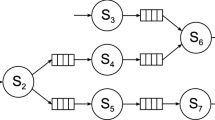Abstract
This paper presents an approximate decomposition method for the performance evaluation of non-homogeneous fabrication/assembly (F/A) systems with multiple failure modes, finite buffers, and a fixed assembly proportion. First, we introduce a mixed flow combined with fund flow and material flow to convert an F/A system to a virtual transfer line. Then, we decompose the virtual transfer line into several two-machine lines and establish a continuous decomposition model. To tackle the new emerging characteristics of the F/A system, we propose an F/A decomposition algorithm (FADA) for solving this model and obtain the throughput and buffer level of the F/A system to evaluate system performance. Also, we demonstrate the validity of the proposed model and algorithm by comparing with the results of simulation-based method and completion time approximation (CTA)-based method. Finally, we analyze the impact of several key parameters, including failure rates, repair rates, and buffer capacities, on the performance of the F/A system. The results show that our analytical method outperforms the existing methods and can help production managers to evaluate the system performance, analyze the possible modifications, and further find the best performance improvement of such F/A systems.
Similar content being viewed by others
References
Tao F, Zuo Y, Xu L, Zhang L (2014) IoT-based intelligent perception and access of manufacturing resource toward cloud manufacturing. IEEE Trans Ind Inf 10(2):1547–155731
Wang J, Fan G, Yan F, Zhang Y (2016) Research on initiative scheduling mode for a physical internet-based manufacturing system. Int J Adv Manuf Technol 84(1–4):47–58
Tao F, Cheng JF, Qi QL, Zhang M, Zhang H, Sui FY (2017) Digital twin driven product design, manufacturing and service with big data. Int J Adv Manuf Technol. doi:10.1007/s00170-017-0233-1
Gershwin SB (1994) Manufacturing systems engineering. Prentice Hall, Englewood Cliffs
Li J, Meerkov SM (2008) Production systems engineering. Springer, Heidelberg
Levantesi R, Matta A, Tolio T (2000) Performance evaluation of assembly/disassembly systems with deterministic processing times and multiple failure modes. Special International Conference on Production Research
Dallery Y, Le Bihan H (1997) Homogenisation techniques for the analysis of production lines with unreliable machines having different speeds. Eur J Control 3(3):200–215
Dallery Y, David R, Xie XL (1989) Approximate analysis of transfer lines with unreliable machines and finite buffers. IEEE Trans Autom Control 34(9):943–953
Gershwin SB, Berman O (1981) Analysis of transfer lines consisting of two unreliable machines with random processing times and finite storage buffers. AIIE Trans 13(1):2–11
Tolio T, Matta A, Gershwin SB (2002) Analysis of two-machine lines with multiple failure modes. IIE Trans 34(1):51–62
Liu J, Yang S, Wu A, Hu SJ (2012) Multi-state throughput analysis of a two-stage manufacturing system with parallel unreliable machines and a finite buffer. Eur J Oper Res 219(2):296–304
Gershwin SB (1987) An efficient decomposition method for the approximate evaluation of tandem queues with finite storage space and blocking. Oper Res 35(2):291–305
Maggio N, Matta A, Gershwin SB, Tolio T (2009) A decomposition approximation for three-machine closed-loop production systems with unreliable machines, finite buffers and a fixed population. IIE Trans 41(6):562–574
Gershwin SB, Burman MH (2000) A decomposition method for analyzing inhomogeneous assembly/disassembly systems. Ann Oper Res 93(1/4):91–115
Dallery Y, David R, Xie X (1988) An efficient algorithm for analysis of transfer lines with unreliable machines and finite buffers. IIE Trans 20(3):280–283
Gershwin SB (1984) An efficient decomposition method for the approximate evaluation of production lines with finite storage space. Anal Optim Syst 63:645–658
Syrowicz D (1999) Decomposition analysis of a deterministic, multiple-part-type, multiple-failure-mode production line. Dissertation, Massachusetts Institute of Technology
Burman MH (1995) New results in flow line analysis. Dissertation, Massachusetts Institute of Technology
Rao PC, Suri R (2000) Performance analysis of an assembly station with input from multiple fabrication lines. Prod Oper Manag 9(3):283–302
Belmansour A, Nourelfath M (2010) An aggregation method for performance evaluation of a tandem homogenous production line with machines having multiple failure modes. Reliab Eng Syst Saf 95(11):1193–1201
Koster DR (1987) Estimation of line efficiency by aggregation. Int J Prod Res 25(4):615–625
Lim JT, Meerkov SM, Top F (1990) Homogeneous, asymptotically reliable serial production lines: theory and a case study. IEEE Trans Autom Control 35(5):524–534
Le Bihan H, Dallery Y (2000) A robust decomposition method for the analysis of production lines with unreliable machines and finite buffers. Ann Oper Res 93(1/4):265–297
Le Bihan H, Yves D (1999) An improved decomposition method for the analysis of production lines with unreliable machines and finite buffers. Int J Prod Res 37(5):1093–1117
Xia B, Zhou B, Chen C, Xi L (2016) A generalized-exponential decomposition method for the analysis of inhomogeneous assembly/disassembly systems with unreliable machines and finite buffers. J Intell Manuf 27(4):765–779
Tolio T, Matta A, Jovane F (1998) A method for performance evaluation of automated flow lines. CIRP Ann Manuf Technol 47(1):373–376
Levantesi R, Matta A, Tolio T (2003) Performance evaluation of continuous production lines with machines having different processing times and multiple failure modes. Perform Eval 51(2–4):247–268
Gershwin SB (1991) Assembly/disassembly systems: an efficient decomposition algorithm for tree-structured networks. IIE Trans 23(4):302–314
Author information
Authors and Affiliations
Corresponding author
Rights and permissions
About this article
Cite this article
Wang, JQ., Yan, FY., Cui, PH. et al. Modeling and analysis of non-homogenous fabrication/assembly systems with multiple failure modes. Int J Adv Manuf Technol 94, 3309–3325 (2018). https://doi.org/10.1007/s00170-017-0785-0
Received:
Accepted:
Published:
Issue Date:
DOI: https://doi.org/10.1007/s00170-017-0785-0




